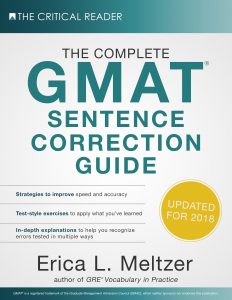When it comes to GMAT grammar, it can be helpful to distinguish between those idioms whose use is tested (that is, ones that may be presented in either correct or incorrect form) and idioms whose misuse is tested (that is, ones that are almost always used incorrectly when they appear). Due to offers an excellent case in point.
In real life, it is of course perfectly acceptable to say things like He arrived half an hour late due to the rain, or Consumer spending is down due to the recession. In fact, this use of due to is so common that most people won’t even think twice when they hear it. The phrase is generally considered an all-purpose synonym for because.
Unfortunately, that usage is not technically correct — and that is exactly why the GMAT targets it.
In reality, due to is a synonym for caused by. If you’re not sure whether due to is being used correctly, plug in caused by, and see if the sentence still makes grammatical sense. If it doesn’t, because or another, grammatically appropriate synonym should be used instead.
For example, try plugging in caused by to one of the examples above:
Incorrect: Consumer spending is down caused by the recession.
Clearly, that does not work!
Correct: Consumer spending is down as a result of the recession.
Much better.
Now, consider a sentence closer to what you’ll encounter on the GMAT:
Correct: At the Battle of Waterloo, the French army formed a homogeneous national force whose high morale was due to (caused by) the belief that Napoleon was the greatest soldier since Julius Caesar.
Here, due to actually makes sense; however, the chance that it will appear in a correct answer on the GMAT is extremely low. The GMAC is primarily interested in whether you can identify when it is being used incorrectly. Answers that include because (of) or as a result (of) are, in contrast, far more likely to be correct.
That means you’re likely to see questions that look something like this:
At the Battle of Waterloo, the French army formed a homogeneous national force, and its moral was high due to the belief that Napoleon was the greatest soldier since Julius Caesar.
(A) national force, and its morale was high due to the belief
(B) national force whose high morale resulted from the belief
(C) national force, and its high morale because of their believing
(D) national force, with its morale that was high because of the belief
(E) national force, its high morale being due to their belief
A split like this makes it pretty clear what’s being tested. You could, of course, read meticulously through each answer, considering how it sounds.
A much more effective approach, however, is to work as follows:
-(A) and (E) contain due to — assume they’re wrong.
-(C) is wordy and contains a gerund, believing, so you can assume it’s wrong as well. (It also creates a nonsense construction when plugged by into the sentence.)
-(D) is the longest answer, and it’s also very awkward. It can be eliminated too.
That leaves (B), which is clean, clear, and correct.
For more about GMAT grammar, see the Complete GMAT Sentence Correction Rules

